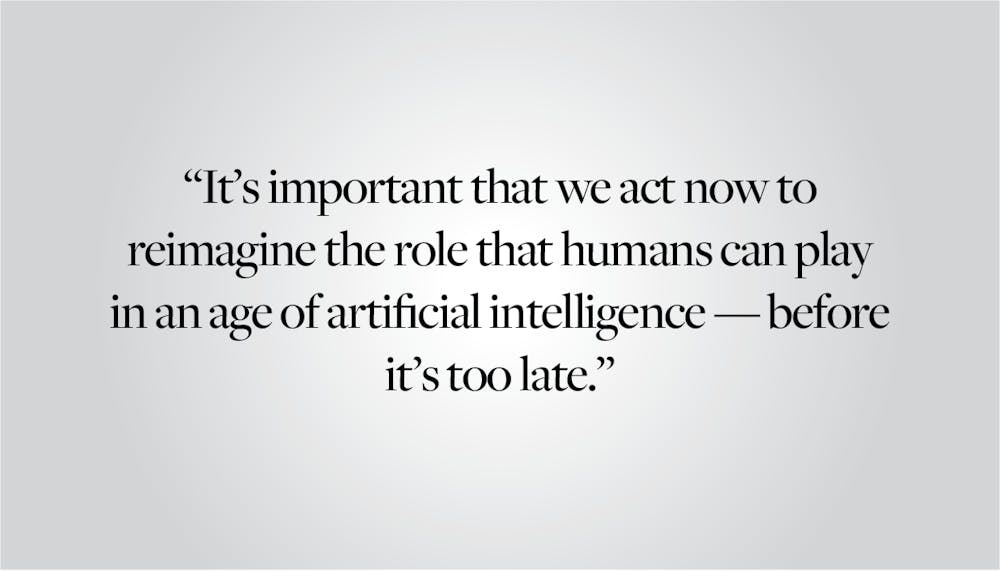I met ChatGPT this weekend, and our introduction left me as stunned as the rest of the world. I asked the chatbot to write a 700-word newspaper opinion piece on separating the art from the artist, and it wove together a nuanced, argumentative essay within seconds. Artificial intelligence is encroaching on skill sets that we’ve always thought of as exclusively human. We are called to adapt, not resist, if we want a place in our own future.
OpenAI, a San Francisco-based research company, launched ChatGPT to the public in late November, garnering 1 million users in only five days. ChatGPT, short for “Chat Generative Pre-Trained Transformer” uses a language-processing AI model that has astounded its audience with how well it communicates at the human level. The model, trained on a vast amount of text data, enables high-caliber responses to our many inquiries. From writing college-level essays and computer programs to passing graduate school exams to explaining complex concepts with enough simplicity for a four-year-old to understand, ChatGPT has broken all precedents for what an AI model like this is capable of.
Even though systemic issues of misinformation and software bias have emerged — and the site is prone to crashing, ChatGPT marks only the genesis of generative AI text models. We should see it as a warning that advanced AI programs are here to stay. AI will get more accurate, and it will also become increasingly disruptive to historically human functions. It’s important that we act now to reimagine the role that humans can play in an age of artificial intelligence — before it’s too late.
This process could be uncomfortable, painful and filled with loss. The thought that something as personal as writing may no longer be an important human skill is deeply saddening. But the more we hold on to what is comfortable and refuse to adapt, the more redundant we make ourselves. We have to begin identifying the skills that will keep each of us relevant in a quickly changing society and job market. Interpersonal communication, emotional intelligence, creativity, critical thinking and judgment are all skills that are not easily replaced. Perhaps we need less time dedicated to conventional subjects like math and English, and more attention on building and fortifying these more abstract features that distinguish humans from technology.
The way schools and universities react to increasingly powerful AI will be pivotal in determining our preparation for AI. Thus far, many educators have chosen the path of resistance with ChatGPT, worrying that AI will lead to a new cheating epidemic. Since its release, students have already used ChatGPT not only to complete their homework assignments but to excel at them. To preserve the learning process, many school districts — Seattle, Los Angeles, New York, Virginia, and Alabama — have already banned students from accessing ChatGPT on school devices and networks.
Yet, banning student access to ChatGPT is a mistake. AI is our future, and we don’t have the luxury to dismiss it. Banishing AI-based tools like chatbots to the margins will only delay inevitable changes in the classroom. We adapted to graphing calculators and redesigned how we test math in the classroom; we adapted to online learning and remote school during the COVID-19 pandemic — we are more versatile than we think we are. The time spent preserving a soon-to-be outdated system is time lost teaching humans new skills that will actually be of value in an AI-based future. Teaching interpersonal skills in the classroom could take many forms including courses on happiness, community building, empathy or the psychology of creativity, for example, all of which would mark a valuable step in redirecting the goals of academia. Instead of pretending that AI doesn’t exist or isn’t a valuable learning tool, teachers should embrace it in their classrooms while preparing their students to inhabit the world that it will create.
As AI advances, we must commit to making foundational changes in our education and reskilling systems. Adapting is the only solution if we want to be the drivers in this imminent technological revolution.
Yael Wellisch ’26 can be reached at yael_wellisch@brown.edu. Please send responses to this opinion to letters@browndailyherald.com and other op-eds to opinions@browndailyherald.com.
Yael is the senior editor of opinions of The Herald's 135th editorial board. She previously served as an opinions editor and a member of the Editorial Page Board. She is from Washington, D.C. and studies history and international and public affairs.





